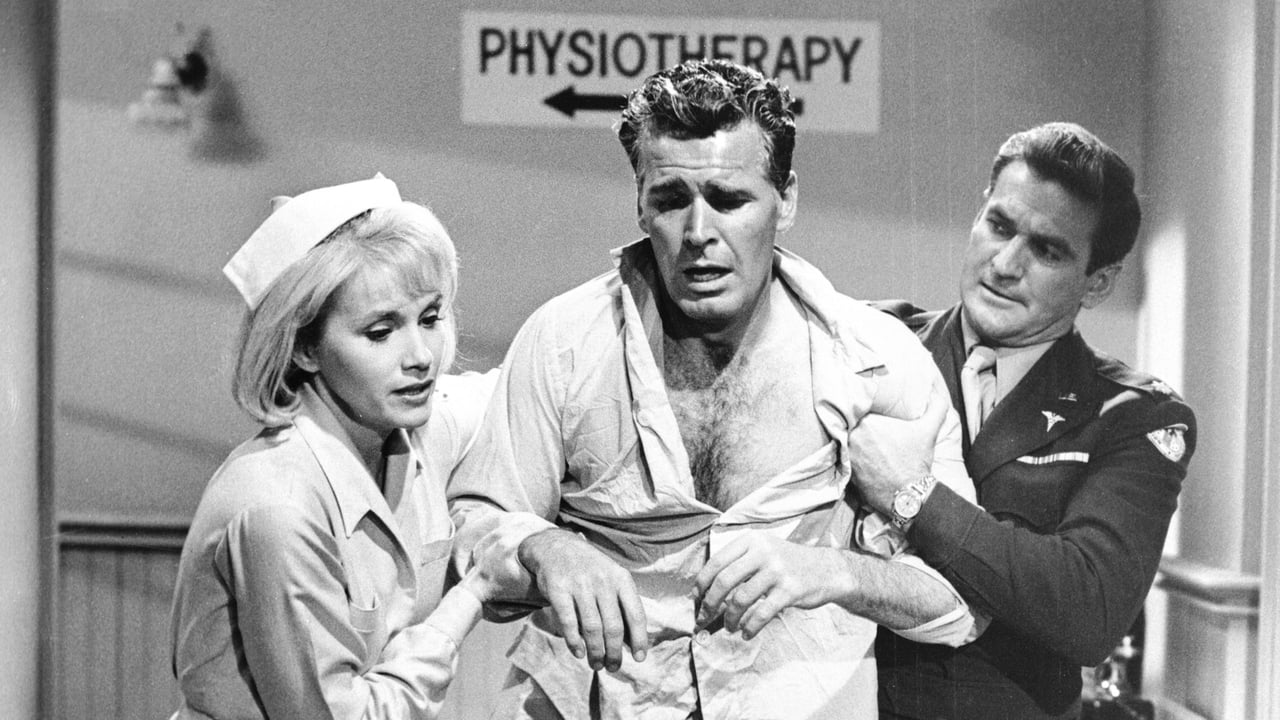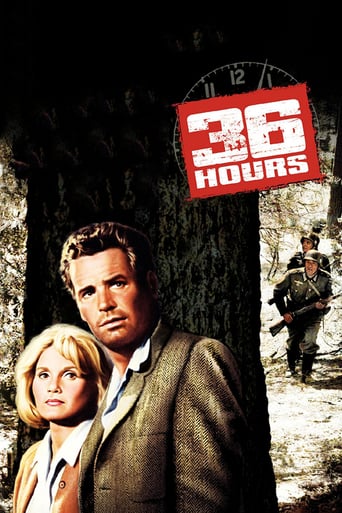

My favourite war movie, 36 Hours is a taut and engrossing thriller. I first saw at the time it was released and never forgot the memorable story line, although it took me more than 4 decades to track it down again. It trades heavily on the viewer's buy-in regarding the importance of the success of D-Day in saving the free world. It's funny that although we're all well aware that the D-Day landings succeeded we can't help being genuinely fearful while viewing the film about the Germans getting the details in advance, and that keeps us on the edge of or seats. Other critics feel the suspense lapses when the jig is initially up with hero, but I beg to differ. At that stage other elements are introduced. Our sympathy with the heroine Anna is developed by learning more about her, and similarly the character of the German doctor Walter Gerber becomes more interesting as his tense relationship with the Nazi side deteriorates.It truly ain't over til it's over in this film with the humour introduced by the unpredictable John Banner character. Finally, my favourite bit of all is at the end of the film. It's subtle and full of sentiment without being in the least sentimental. Well done! I'd rank 36 Hours an 8/10 overall. The missing points are because of the lack of any attempt to provide costumes and hairstyles in period, and because I feel the lovely Rod Taylor is miscast in the role of the doctor.
... View More36 Hours (1965)There is a huge trick to this sparkling, powerful movie. And some might say the trick is too much. But think of the 1962 "Manchurian Candidate" and you have an idea what level of inventive storytelling is at work, and which indeed works. "36 Hours" is not as sensational as that film earlier, and for that reason not as memorable. But in some ways it's equal to it. The acting, especially by the four main leads, is first rate. It's convincing in a plot that takes some work to be convincing. There are hints here of the landmark television series "The Prisoner" at first, too (that series launched in 1967 but McGoohan, the central planner of "The Prisoner," outlined it in a 1965 interview!).At first you think this will be another war film, with James Garner playing a half-convincing top military adviser and courier (he's too young, too good looking, and far too casual). But then he gets kidnapped and the twists that follow are what make the movie. Garner gets better and better in his role, playing the game several ways as it unfolds. At his side is Eva Marie Saint, who is excellent even down to a fair middle-European accent. A charming and disarming German doctor played by Rod Taylor is key to this whole charade, as he, too, plays two sides to a coin. The more severely obvious SS officer (Werner Peters) is brilliant, and not a caricature, and he represents the whole German evil machine circa 1944. Or is it 1950? Keep a grip on reality as you watch. There are some small subtle cues as you go. For one thing, it's expected that most of the audience in 1965 still knew that D-Day was Jun 6, 1944. They will play with the date of that as if you know. And there was (famously) a delay due to rainy weather that shows up, too.You might even watch a D-Day classic like "The Longest Day" just to set the stage and get some broad facts, if you feel gung-ho. Or dive into this for the filming (gorgeous widescreen black and white) and acting, as well as the smart story. A great discovery.
... View MoreA film called Resisting Enemy Interrogation was released in 1944. Ostensibly, it was produced to dramatically demonstrate that any information (other than name, rank and serial number) provided by captured American soldiers could potentially cost American lives.In the film 36 Hours (1965), Major Pike (James Garner)is a captured American serviceman. He is the object of a clever German ruse devised by Major Gerber(Rod Taylor)to get him to reveal inside information about the Allied plans for the D-Day invasion. The action is set in 1944, so we can assume that Major Pike has been briefed on German interrogation techniques and warned of the various ploys that might be used to soften him up. In fact, this is asserted in the film.Eva Marie Saint plays the part of Anna, Gerber's collaborator. Playing on Pike's vulnerability, she helps convince Pike that the date and the location of his convalescence are not what he might have expected. I do not want to reveal much more about the plot, because the main enjoyments of this story come from the premise of the film and the various plot twists. Suffice it to say that this story of intrigue is worthy of Hitchcock.The title refers to the length of time the SS gives Major Gerber to prove the value of his unorthodox interrogation method. The time limit helps drive the action--fine use of a Hitchcock method, but without frequent images of a clock counting down. Speaking of Hitchcock, Eva Marie Saint played in North by North West (1959) and gives a performance as convincing in 36 Hours.I recommend this film for it plot that captures the imagination, the excellent performances by all actors, and a quality score.Watch for John Banner's portrayal of a German sergeant. In 1965 he will also begin his role as Sergeant Schultz in TV's Hogan's Heroes.
... View MoreVery good film with Jim Garner, Eva Marie Saint and Rod Taylor in basically a cat and mouse game.Garner is captured by the Nazis and is made to believe that he is an amnesia victim who has had his memory restored in the year 1950.The movie does lose some of it potency once Garner discovers the ruse.The film then becomes one of the Nazis not believing Garner when he had send that the allied invasion would occur at Normandy. Ms. Marie-Saint plays a nurse, who had been released from a concentration camp so that she could participate in the duping of Garner. She is very good in the part as she evokes the facade of a concentration camp survivor.Also excellent is Rod Taylor as the German doctor, American born, he went to live in Germany at age 16. You do wonder though why he ever fell in with the Nazi movement.
... View More